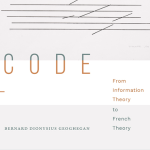electropoetics
Review of Bernard Dionysius Geoghegan’s Code: From Information Theory to French Theory (Duke UP 2022)

Is it possible to discover digital prophecies in thinkers like Lacan, Barthes, Derrida, Foucault, Deleuze, and Baudrillard? Heckman has a go at it in this close reading of Dionysius Geoghegan's Code: From Information Theory to French Theory.
Off Center Episode 4: Meme Culture, Social Media, and the January 6th Insurrection with Ashleigh Steele

Scott Rettberg, director of the Center for Digital Narrative is joined by journalist and Digital Culture graduate Ashleigh Steele to talk about memes, post-truth and the way narrativity shapes our understanding of ourselves and our world. We are increasingly affected by algorithms, AI and conspiracy theories, but what kind of effect does this have on our discourse, and how do we fight back?
In Memoriam, George Landow

The editors at ebr asked Bobby Arellano to draft a reflection on the passing of George Landow. Working with Landow in the early years of the Victorian Web, Arellano transferred most of the documents from the Intermedia system into Storyspace and relinked them. We present Arellano's reflection, in memoriam, along with an official obit provided by Ruth Landow (George's friend of 78 years and his wife of 57 years).
Off Center Episode 3: Artistic Research and Digital Writing, with Jason Nelson

On this episode of Off Center, Scott Rettberg is joined by artist and poet Jason Nelson to discuss the background behind Jason's weird and intriguing work, creativity in the digital age and the intersection between art and research. Behind every artist there is a story, and Jason's include disappearing masonic rings, Brazilian televangelists and city planning.
Off Center Episode 2: Joseph Tabbi on the Electronic Book Review, Research Infrastructure, and Electronic Literature

CDN Director Scott Rettberg and the Center's Principle Investigator Joseph Tabbi discuss the decades-long development of a born-digital, community based publication. The Electronic Book Review brings together literary scholars and conceptual artists from a widening set of disciplines and geographical regions. While foregrounding critical discourse, the journal will bring to our readership the sorts of activities that we'll be featuring in our e-lit node: activities which we designate as a Publishing And Infrastructure Group (PAIG). As our readers pick up on things that our authors have written, they too become an active part of our discursive community. Debates and dialogues are thus the order of the day, as authors and audiences begin to merge.